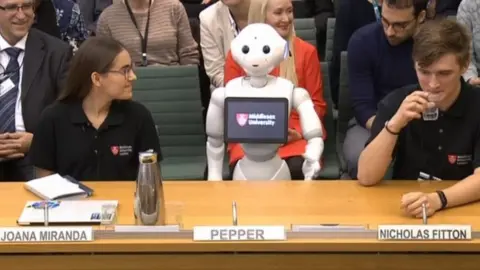Robot 'talks' to MPs about future of AI in the classroom
Pepper has become the first robot to appear at a UK parliamentary meeting, talking to MPs about the future of artificial intelligence in education.
The robot is currently based at Middlesex University, working with students and appearing at events.
MPs smiled when the robot was wheeled in, although both questions and answers were pre-arranged.
Tory MP Lucy Allan joked that Pepper was "better than some of the ministers we have had before us".
The Education Committee is looking at the impact technologies such as AI and robotics will have on education.
After introducing itself, Pepper told MPs: "Robots will have an important role to play - but we will always need the soft skills that are unique to humans to sense, make and drive value from technology."
Labour MP James Frith asked all the questions, possibly because he was sitting closest to Pepper. He delivered them loudly and slowly to ensure Pepper understood.
Pepper is used by students on a series of projects, including:
- helping children with special needs improve their numeracy
- caring for older people
It also attends Stem (science, technology, engineering, and mathematics) fairs and conferences.
 AFP
AFPA handful of universities and schools around the UK now own a Pepper robot. They cost between £10,000 and £12,000 and can recognise faces and make eye contact.
Not everyone was impressed that Pepper was representing the AI community in parliament. Professor Michael Wooldridge, head of AI at Oxford University, told the BBC it was an "embarrassing gimmick" which gave AI "a bad name".
Broader curriculum
The humans being questioned by the committee agreed that the current educational system had to change drastically to accommodate the pace of technological change.
Brian Holliday, managing director for Siemens Digital Factory, said there was a need for greater co-operation between schools and technology companies and for educators to concentrate on not just "knowledge-based learning" but also "applied learning" from the world of work.
And he disputed studies that suggest many jobs would be lost to AI or machines.
"We have taken people from the factory floor and moved them on to our digitalisation teams," he said, when asked about the need to re-skill the current workforce.
Meanwhile, Prof Rose Luckin, from University College London's Knowledge Lab, said AI could play a useful role in the classroom, taking over mundane tasks such as data collection, assessment, administration and lesson planning.
But, she added: "If we don't get this right, too much of what we should be doing will be allocated on to machines."
Joysy John, director of education at innovation foundation Nesta, said educationalists needed to introduce a broader curriculum that took account of problem solving and critical thinking as well as preparing children for the age of machine learning and ensuring they did not fear robots and AI.
It was not just computer science skills that were needed as we entered the fourth industrial revolution, she said, people with critical and creative thinking skills would also be crucial - and there was a "high level of unemployment" among recent computer science graduates.
